
DEVO is an American rock band from Akron, Ohio, formed in 1973. Their classic lineup consisted of two sets of brothers, the Mothersbaughs and the Casales, along with Alan Myers. The band had a No. 14 Billboard chart hit in 1980 with the single "Whip It", the song that gave the band mainstream popularity.
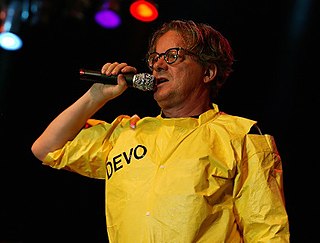
Mark Allen Mothersbaugh is an American composer, singer, and multi-instrumentalist. He came to prominence in the late 1970s as co-founder, lead singer and keyboardist of the new wave band Devo, whose "Whip It" was a top 20 single in the US in 1980, peaking at 14, and which has since maintained a cult following. Mothersbaugh is one of the main composers of Devo's music.
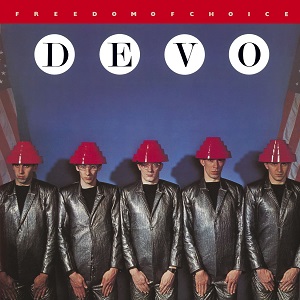
Freedom of Choice is the third studio album by the American new wave band Devo. It was originally released in May 1980 on the Warner Bros. label. The album contained their biggest hit, "Whip It", which hit No. 8 and No. 14 on the Billboard Club Play Singles and Pop Singles charts, respectively. Freedom of Choice peaked at No. 22 on the Billboard Pop Albums chart.

"Life on Mars?" is a song by English singer-songwriter David Bowie, first released on his 1971 album Hunky Dory. In 1968, Bowie was commissioned to write English lyrics for the Claude François French song "Comme d'habitude". After his lyrics were rejected, songwriter Paul Anka rewrote it into "My Way", which was made famous by singer Frank Sinatra in 1969. Annoyed at the success of "My Way", Bowie used the song as a template and wrote "Life on Mars?" as a parody of Sinatra's recording. Like other songs Bowie wrote during this period, it was written primarily on piano. Recording for "Life on Mars?" took place on 6 August 1971, the final day of the Hunky Dory sessions. Co-produced by Bowie and Ken Scott, the backing band consisted of guitarist Mick Ronson, bassist Trevor Bolder and drummer Mick Woodmansey; Ronson also composed the song's string arrangement. After failing to acquire pianist Dudley Moore, piano was played by Strawbs member Rick Wakeman.

The Life Aquatic with Steve Zissou is a 2004 American comedy-drama film written by Wes Anderson and Noah Baumbach and directed by Anderson. It is Anderson's fourth feature-length film and was released in the United States on December 25, 2004.
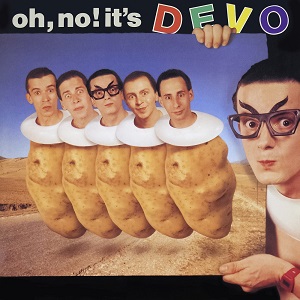
Oh, No! It's Devo is the fifth studio album by the American new wave band Devo. It was originally released in October 1982, on the labels Warner Bros. and Virgin. The album was recorded over a period of four months, between May and September 1982, at Cherokee Studios in Los Angeles. By the time of its release, Devo were a full-fledged synth-pop act, with guitar-based new wave sounds pushed more towards the background. Most of the music on Oh, No! It's Devo was created by electronic means, giving it a much different sound than the band's earlier albums, such as their 1978 debut Q: Are We Not Men? A: We Are Devo!, which relied more on guitars than synthesizers. This alienated some fans, despite the band stating since at least 1978 that their goal was to "de-emphasize" guitars. The album was produced by prominent producer Roy Thomas Baker, who had notably worked with, among others, Queen and the Cars.
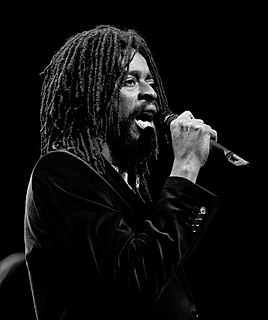
Jorge Mário da Silva, more commonly known by his stage name Seu Jorge, is a Brazilian musical artist, songwriter, and actor. He is considered by many a renewer of Brazilian pop samba. Seu Jorge cites samba schools and American soul singer Stevie Wonder as major musical influences. Jorge is also known for his film roles as Mané Galinha in the 2002 film City of God and as Pelé dos Santos in the 2004 film The Life Aquatic with Steve Zissou. His musical work has received praise from many of his fellow musicians including Beck and David Bowie.

New Traditionalists is the fourth studio album by the American new wave band Devo. It was originally released in August 1981, on the labels Warner Bros. and Virgin. The album was recorded over a period of four months between December 1980 and April 1981, at The Power Station, in Manhattan, New York City. The album's sound continued in the vein of their previous studio album Freedom of Choice, with synthesizers moved even further to the forefront and the guitars becoming more subdued. Some of the tracks featured drum machines for the first time on a Devo album. In addition, the lyrics are frequently dark and vitriolic. It features the minor hits "Through Being Cool" and "Beautiful World".

Q: Are We Not Men? A: We Are Devo! is the debut studio album by the American new wave band Devo. It was originally released in August 1978 on the Warner Bros. label. Produced by Brian Eno, the album was recorded between October 1977 and February 1978, primarily in Cologne, West Germany.

Duty Now for the Future is the second studio album by American rock band Devo, released in July 1979 by Warner Bros. Records. Produced by Ken Scott, the album was recorded between September 1978 and early 1979 at Chateau Recorders in Hollywood. The majority of the songs on the album had been performed in Devo's live set as early as 1976.

Total Devo is the seventh studio album by the American new wave band Devo, released in 1988 by Enigma Records, four years after their previous album, Shout. Despite initial negative reception of the album, "Disco Dancer" hit No. 45 on Billboard's Hot Dance/Club Play chart for the week of September 3, 1988.

Mutato Muzika is an American music production company established and owned by Devo co-founder and lead singer Mark Mothersbaugh in 1989. The name is a portmanteau of the words mutant and potato, a nod to Mothersbaugh's longstanding fascination with mutants and mutation, and to Devo fans, whom the band dubbed "spuds," early on.
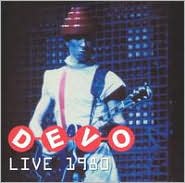
DEVO Live 1980 is a DualDisc release by pioneering new wave band Devo.

Robert Leroy Mothersbaugh, Jr., or by his stage name "Bob 1", is an American songwriter, composer, musician and singer.

The Life Aquatic Studio Sessions Featuring Seu Jorge is an album by Brazilian musician Seu Jorge. It is a collection of David Bowie songs Jorge recorded in Portuguese for the soundtrack to the film The Life Aquatic with Steve Zissou.

DEV-O Live is a live EP by American new wave band Devo. It was recorded during the Freedom of Choice tour of 1980, at the Fox Warfield Theatre. Initially only six songs from the show were released on an EP in 1981, intended for airplay use. It featured the otherwise-unreleased "Freedom of Choice Theme Song" and a reworked version of "Be Stiff".
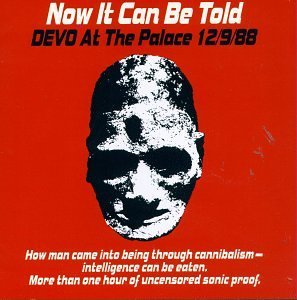
Now It Can Be Told: DEVO at the Palace is a live album released by American new wave band Devo, recorded during their 1988 "comeback tour" in promotion of the Total Devo album. It contains performances of several cuts from Total Devo but largely focuses on earlier material and also contains one exclusive song, "It Doesn't Matter to Me."
Sven Erik Libaek is a Norwegian-Australian composer, record producer and musician. He composes film and TV soundtrack music and, as the staff producer for the Australian division of CBS Records, influenced the Australian popular music scene in the mid-1960s. In 1982, an album titled Endless Love peaked at number 71 in Australia; his only top 100 charting release.

Thor: Ragnarok is the film score to the Marvel Studios film Thor: Ragnarok composed by Mark Mothersbaugh. Hollywood Records released the album digitally on October 20, 2017, with a physical release on November 10, 2017.
David Kendrick is an American rock drummer who is a former member of Gleaming Spires and Devo, and has recorded and toured with Sparks. He is based in Los Angeles, California.


















